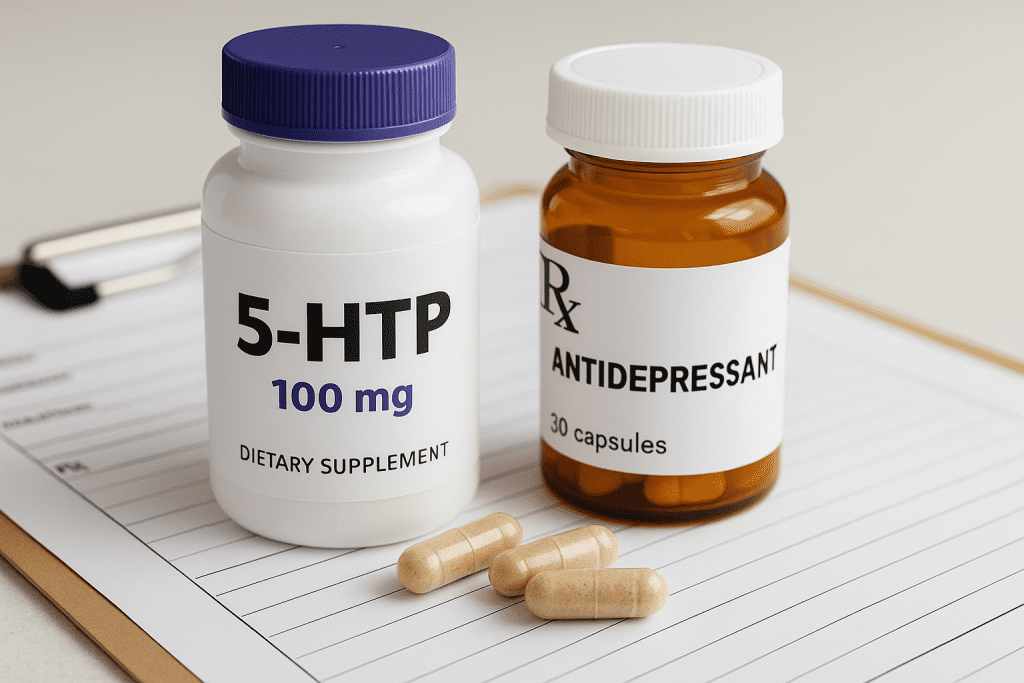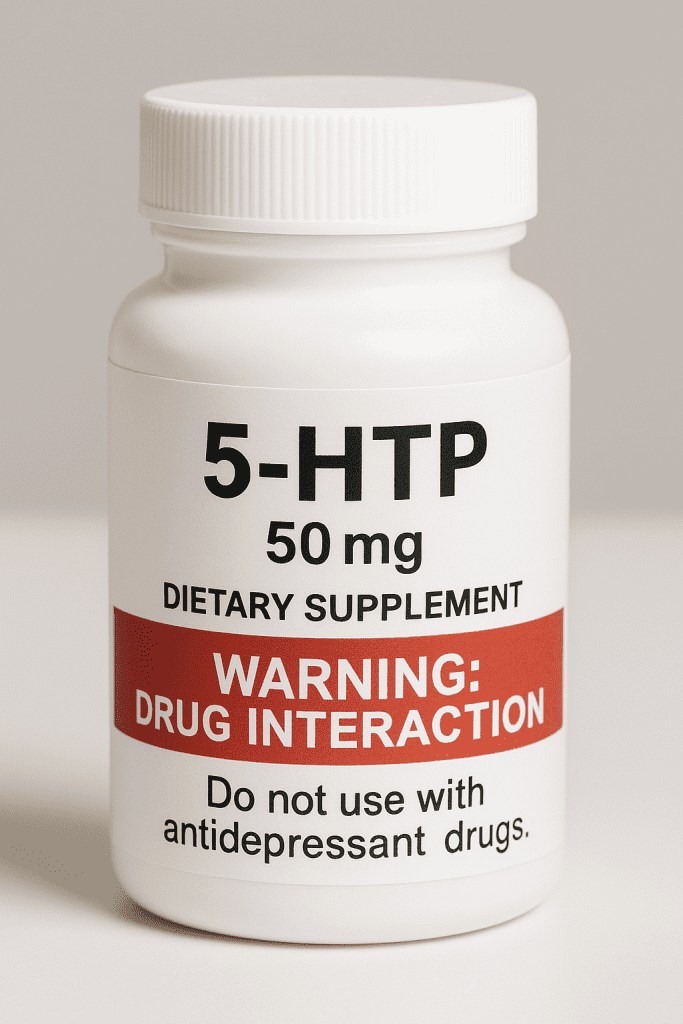Combining 5-HTP with antidepressants can dangerously elevate serotonin levels, potentially triggering serotonin syndrome — a serious, sometimes life-threatening condition. If you’re using selective serotonin reuptake inhibitors (SSRIs) or other serotonergic medications, it’s critical to understand how supplementing with 5-hydroxytryptophan (5-HTP) may interact.
This guide explores the science, clinical evidence, and medical advice surrounding the 5-HTP antidepressant interaction, helping you navigate safety, symptoms, and alternatives with confidence.

Summary: Should You Combine 5-HTP with Antidepressants?
| Concern | Details |
|---|---|
| Primary Risk | Serotonin syndrome due to elevated serotonin levels |
| Symptoms to Watch | Tremors, agitation, confusion, high fever, diarrhea |
| Official Warnings | Drug databases and toxicology centers advise against combining 5-HTP with SSRIs |
| Alternatives | Medically supervised augmentation or non-serotonergic options |
| Bottom Line | Avoid combining without close supervision; the serotonin syndrome risk is real and serious |
What Is Serotonin Syndrome?
Serotonin syndrome is a condition resulting from excessive serotonergic activity in the central nervous system. It’s most commonly triggered by drug interactions that increase serotonin levels — including the combination of 5-HTP and SSRIs or other antidepressants.
Common Symptoms
- Neuromuscular: tremors, clonus, muscle rigidity
- Mental: agitation, confusion, hallucinations
- Autonomic: high blood pressure, fever, rapid heart rate, sweating
- In severe cases: seizures, coma, or multiple organ failure
The Mayo Clinic emphasizes that serotonin syndrome can develop quickly — often within hours — and requires immediate medical attention.
Why Combining 5-HTP with Antidepressants Increases Risk
5-HTP is a direct precursor to serotonin. When you supplement with it, you’re essentially adding raw material for serotonin production. SSRIs, on the other hand, prevent serotonin reabsorption, increasing its availability in the brain. Together, these mechanisms stack the serotonin load, creating a perfect storm for serotonin syndrome.

Scientific Support
According to Examine.com, animal studies consistently show that combining 5-HTP with SSRIs raises the risk of serotonin toxicity. Research published on PubMed also found that this combo can intensify serotonergic effects in rodents, including tremors and gastrointestinal upset.
While 5-HTP alone at normal doses is typically safe, the presence of SSRIs or MAOIs dramatically changes the safety profile. A 2021 clinical case documented serotonin syndrome and compartment syndrome requiring emergency surgery after combining sertraline with 5-HTP.
Medical Warnings and Clinical Guidelines
Most authoritative drug databases and medical institutions issue strong warnings against this combination:
Drug Interaction Tools
- Drugs.com flags this interaction as “major”, advising against use.
- Medscape classifies the risk as “serious” for many SSRI and MAOI combinations.
Poison Control Guidance
The American Association of Poison Control Centers explains that 5-HTP “can cause serious drug interactions with medications used to treat depression,” and urges patients to consult a healthcare provider before starting.
Emergency Protocols
The Irish Association for Emergency Medicine emphasizes that serotonin syndrome requires fast recognition and emergency care. Although their guidelines don’t mention 5-HTP by name, the overlap in mechanisms makes the warning relevant.
Case Reports and Clinical Evidence
Real-world cases underscore the danger:
- In a peer-reviewed case, a young man taking sertraline and 5-HTP developed serotonin syndrome and acute compartment syndrome, requiring surgery.
- Another case published by Poison Control describes a woman on Zoloft who developed hallucinations, tremors, and diarrhea after starting 5-HTP.
These aren’t isolated incidents. Medical literature has documented multiple such reactions, especially when users self-medicate without supervision.
Alternatives to 5-HTP for Antidepressant Users
If you’re seeking mood support or looking to augment your current therapy, there are safer strategies than combining 5-HTP with SSRIs.
Safer Options May Include:
- Cognitive Behavioral Therapy (CBT) or other psychotherapies
- Non-serotonergic supplements such as omega-3s or saffron
- Prescription-based augmentation under supervision (e.g., atypical antipsychotics)
A 2016 study in Neuropsychopharmacology explored slow-release 5-HTP as an augmentation strategy, but only under strict clinical control — not over-the-counter use.
Explore our post on “Pregnancy-safe supplements with antidepressants” for tailored insights if you’re managing mental health during pregnancy.
When to Seek Medical Advice
If you’re considering 5-HTP and are already taking antidepressants, consult your doctor and pharmacist first. This is especially urgent if you’re experiencing:
- Muscle stiffness
- Rapid heartbeat
- Nausea or vomiting
- Excessive sweating or fever
- Sudden mood shifts
These could be early signs of serotonin syndrome. When in doubt, err on the side of caution — it’s better to pause a supplement than trigger a dangerous cascade.

Providers should also ask proactively about supplement use. As research shows, many adverse interactions happen because physicians are unaware of their patient’s full regimen.
Related Risks: St. John’s Wort and SSRIs
The interaction between 5-HTP and SSRIs isn’t the only one that raises red flags. Herbal supplements like St. John’s Wort can also trigger serotonin overload when combined with antidepressants. Learn more in our article on “Insomnia from St. John’s Wort and SSRIs”, which details how overlapping pathways can disrupt sleep and safety.
Conclusion: Don’t Combine Without Medical Supervision
The medical consensus is clear: combining 5-HTP with antidepressants, especially SSRIs or MAOIs, significantly increases the risk of serotonin syndrome. This interaction is labeled as dangerous by trusted medical sources like Medscape, Drugs.com, and Poison Control.
If you or someone you love is considering supplementing while on antidepressants, the safest course is full disclosure and guided care. Stick to evidence-based options, and if augmentation is needed, work closely with a licensed mental health provider.
For more information about mood-related supplement safety, explore our coverage of pregnancy-safe supplements with antidepressants or browse our mental wellness archive.

